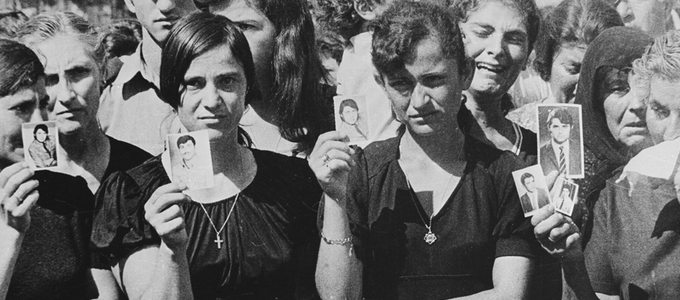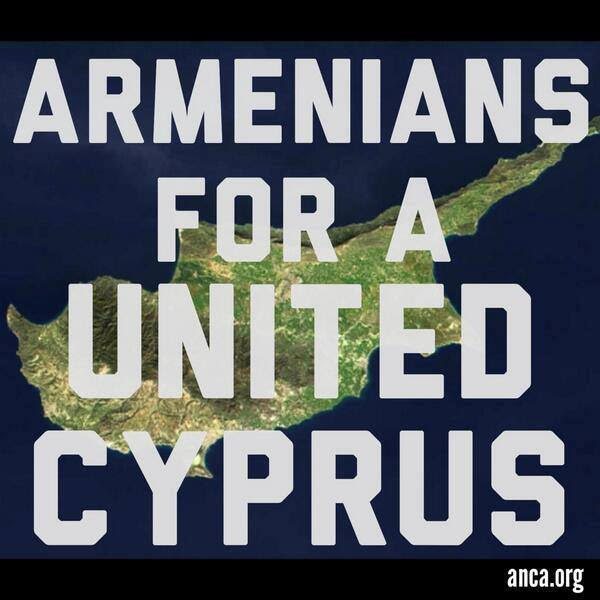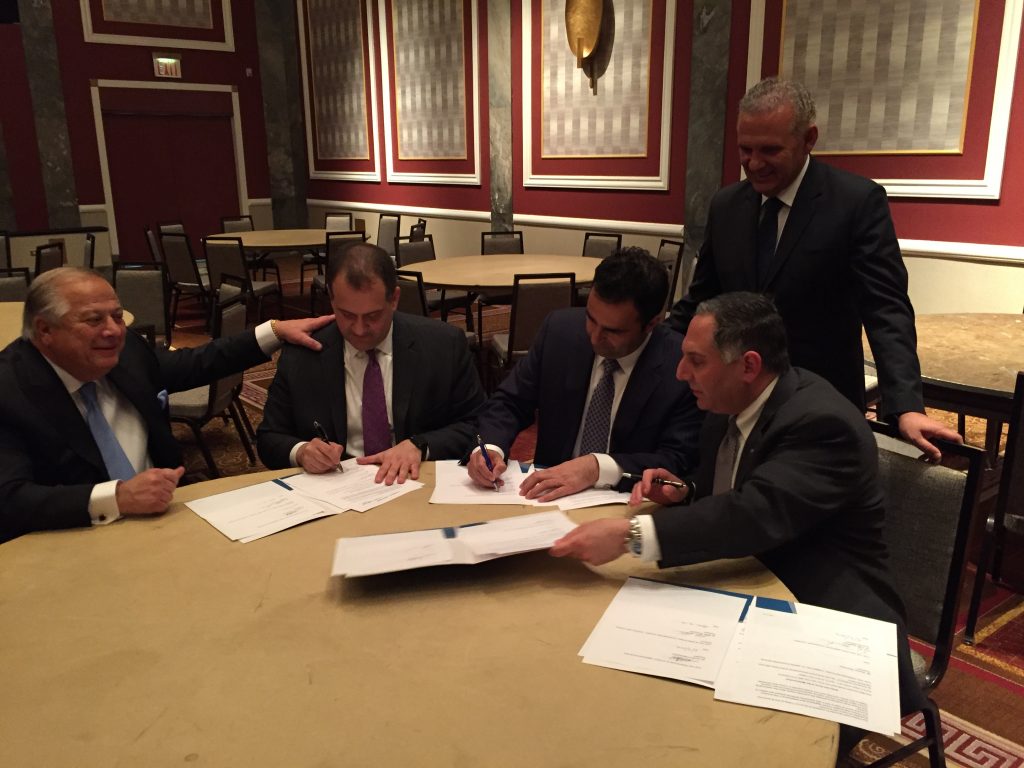By Nayiri Partamian
On July 14, just 24 hours prior to a coup attempt in Turkey and Erdogan’s authoritarian crackdown continuing to this day, Armenian, Greek, Cypriot and other people of good conscience gathered on Capitol Hill to remember an aggression of a different sort—the 42nd “Black Anniversary” of Turkey’s invasion and ongoing illegal occupation of Cyprus.

Cypriots hold up photos of missing family members following Turkey’s 1974 invasion. More than 5,000 Cypriots were killed while hundreds of thousands of refugees were ethnically cleansed and forced into concentration camps. Excavations and DNA testing continue to this day to locate the thousands that are missing and to bring closure to their families.
Beginning on July 20, 1974, Turkish troops, following a coup attempt, attacked Cyprus, effectively splitting the island in two and today occupying over one-third of sovereign Cypriot territory. In the process, more than 200,000 were displaced, about 5,000 killed and some 2,000 people remain missing to this day—including four American citizens. More than 500 Greek Orthodox and other Christian churches—have been pillaged, vandalized or demolished and 77 turned into mosques since the invasion on the Turkish side of Cyprus.
The quest for answers regarding the plight of the missing continues to this day, with Turkish and Cypriot press reports surfacing this June, detailing the existence of mass graves near Adana where many Greek Cypriot prisoners were buried alive or killed. The UN sponsored bi-communal Committee of Missing Persons (CMP), established in 1981, has sought to look into this matter. Turkey, of course, has been disrupting this search from the beginning, attempting to cover up any traces of mass graves and reportedly going as far as assassinating Turkish Cypriot journalist Kutli Adali in 1996 for apparently getting too close to the truth.
The Cyprus invasion is just one in a long series of unpunished crimes committed by the Turkish government—the effects of which are felt to this day.
In the 20th century alone, history documents Ottoman Turkey’s ethnic cleansing of the Bulgarian Thracian community in 1913, the Armenian, Pontian Greek and Assyrian Genocides of 1915-1923, which left more than 3 million dead. Turkey denies these atrocities to this day, working furiously to cover up its crimes, just as they are doing in Cyprus.
So what can we do as a community?
Supporting these causes are not just tasks reserved for Capitol Hill, but there are actions you can take yourself:
Attend a Congressional Briefing: Events like the Capitol Hill commemorating the “Black Anniversary,” hosted by the American Hellenic Institute (AHI) with the support of the Congressional Hellenic Caucus, are important to remind elected officials and the public about Turkey’s continuous aggression and its consequences.
Sign and Share Online Petitions: Lend your voice to the Hellenic American Leadership Council (HALC) campaign calling on Congress to take action to identify the plight of missing Cypriot Americans.
This second petition urges the negotiators of the Cyprus peace process to demand the removal of the 43,000 Turkish troops on sovereign Cyprus soil, inconsistent with a free and unified Cyprus.

The Hellenic and Armenian communities have been cooperating for decades on a broad range of issues, including the reunification of Cyprus.
For its part, the ANCA Eastern Region, building on years of cooperation between the Greek and Armenian communities, signed a Memorandum of Understanding and Cooperation with HALC, Justice for Cyprus (PSEKA) and the Cyprus Federation on April 9, pledging to expand coordinated advocacy efforts on a broad range of issues of interest to our communities—an end to Turkey’s illegal occupation of Cyprus, its blockade against Armenia, its denial of the genocides, self-determination for the people of Nagorno-Karabagh (Artsakh/NKR), and an end to Azerbaijan’s wide scale attacks on NKR.
The bottom line is to be alert through education and advocacy.
We must make sure the U.S. realizes Turkey does not behave as a NATO ally should—occupying a sovereign country, blockading another, remaining an unrepentant perpetrator of genocide, all the while trampling on the democratic rights of their own citizens.
A NATO ally, by definition, should—safeguard the freedom of other NATO members, promote democratic values and be committed to peaceful resolution of disputes—yet Turkey has shown none of these values.

ANCA-ER, HALC, PSEKA, and Cyprus Federation of America sign a Memorandum of Understanding with the participation of Commissioner Photis Photiou, the Republic of Cyprus’ Presidential Commissioner for Humanitarian Affairs and Overseas Cypriots.
There should be concern by the U.S. of Turkey’s aggression up to this day, “that puts to the test the principles and values that govern the modern world and contemporary politics,” says Archbishop Demetrios of the Greek Orthodox Archdiocese of America. These issues stem from Turkey’s history of violence and we as a public should be constantly urging our elected officials to speak out against such actions and stop this pattern of aggression.
Nayiri Partamian is an Armenian National Committee of America (ANCA) Leo Sarkissian Internship (LSI) 2016 intern.
By Nayiri Partamian On July 14, just 24 hours prior to a coup attempt in Turkey and Erdogan’s authoritarian crackdown continuing to this day, Armenian, Greek, Cypriot and other people of good conscience gathered on Capitol Hill to remember an aggression of a different sort—the 42nd “Black Anniversary” of Turkey’s invasion and ongoing illegal occupation of Cyprus. Cypriots hold up photos of missing family members following Turkey’s 1974 invasion. More than 5,000 Cypriots were killed while hundreds of thousands of refugees were ethnically cleansed and forced into concentration camps. Excavations and DNA testing continue to this day to locate the thousands that are missing and to bring closure to their families. Beginning on July 20, 1974, Turkish troops, following a coup attempt, attacked Cyprus, effectively splitting the island in two and today occupying over one-third of sovereign Cypriot territory. In the process, more than 200,000 were displaced, about 5,000 killed and some 2,000 people remain missing to this day—including four American citizens. More than 500 Greek Orthodox and other Christian churches—have been pillaged, vandalized or demolished and 77 turned into mosques since the invasion on the Turkish side of Cyprus. The quest for answers regarding the plight of the [...]
By Nayiri Partamian On July 14, just 24 hours prior to a coup attempt in Turkey and Erdogan’s authoritarian crackdown continuing to this day, Armenian, Greek, Cypriot and other people of good conscience gathered on Capitol Hill to remember an aggression of a different sort—the 42nd “Black Anniversary” of Turkey’s invasion and ongoing illegal occupation of Cyprus. Cypriots hold up photos of missing family members following Turkey’s 1974 invasion. More than 5,000 Cypriots were killed while hundreds of thousands of refugees were ethnically cleansed and forced into concentration camps. Excavations and DNA testing continue to this day to locate the thousands that are missing and to bring closure to their families. Beginning on July 20, 1974, Turkish troops, following a coup attempt, attacked Cyprus, effectively splitting the island in two and today occupying over one-third of sovereign Cypriot territory. In the process, more than 200,000 were displaced, about 5,000 killed and some 2,000 people remain missing to this day—including four American citizens. More than 500 Greek Orthodox and other Christian churches—have been pillaged, vandalized or demolished and 77 turned into mosques since the invasion on the Turkish side of Cyprus. The quest for answers regarding the plight of the [...]
[img][/img]
More...